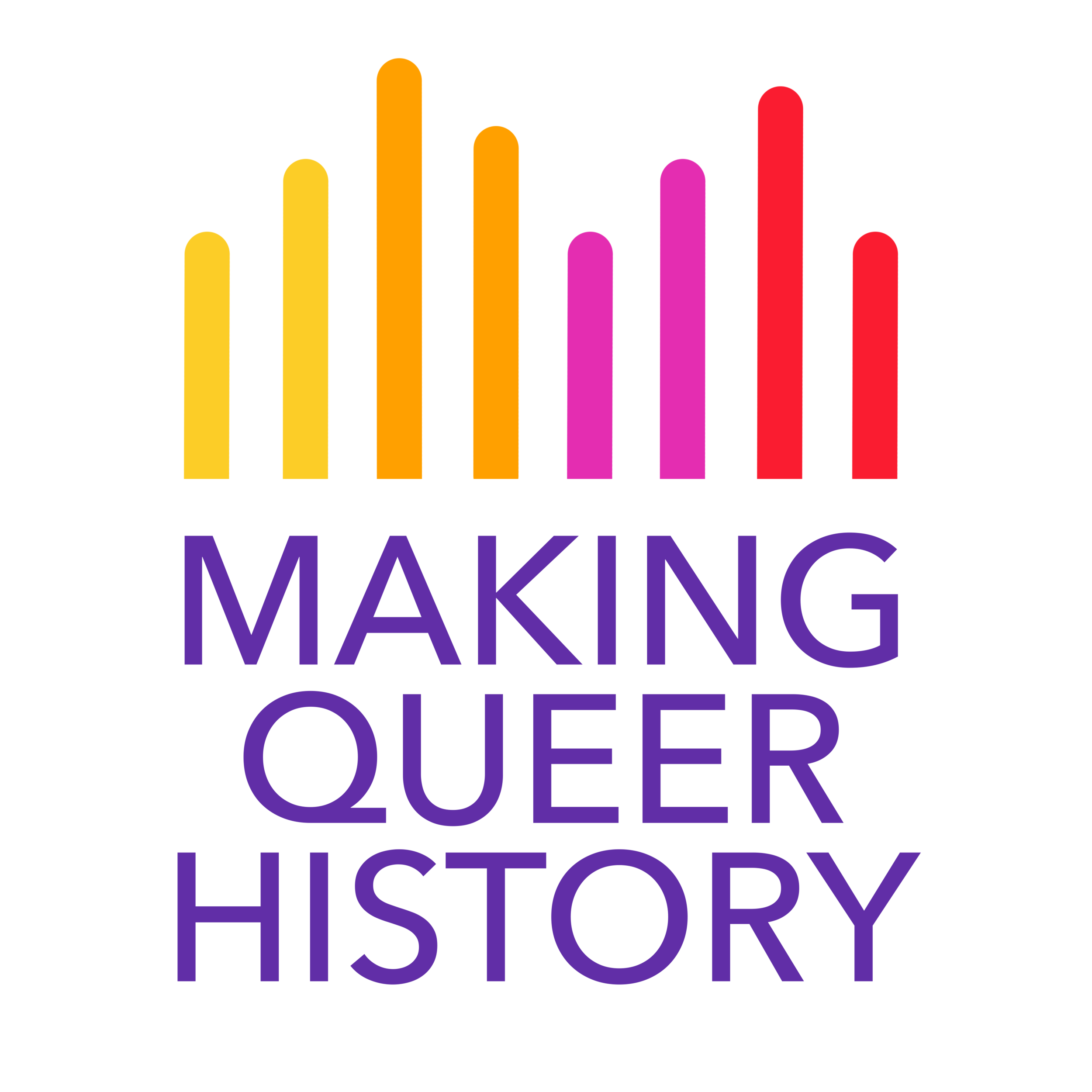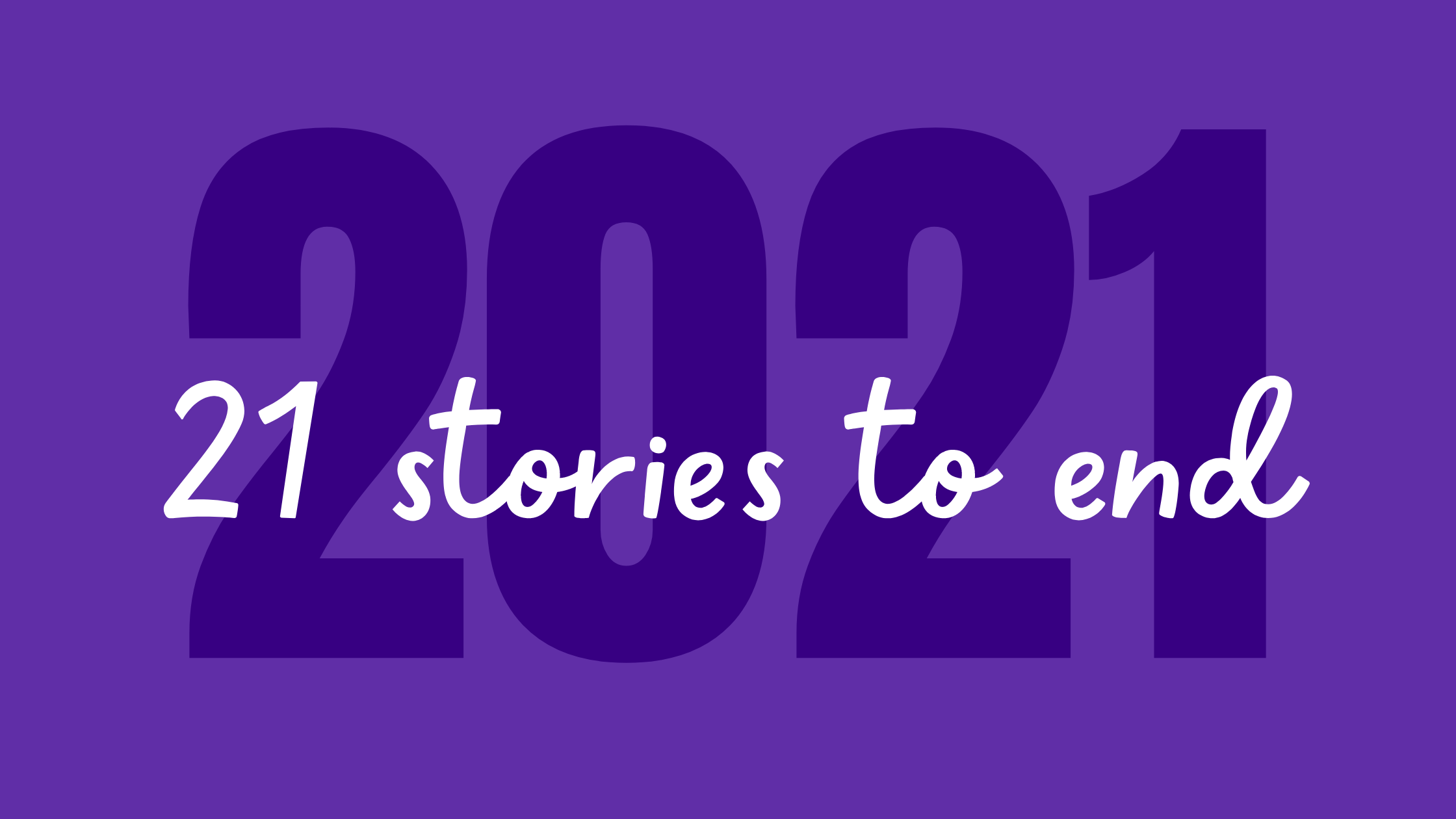Purple background with white text reads 21 stories to end 2021.
1. The Nepal Pride Parade celebrated their third annual parade—virtually
In 2020, two Amplifying Trans Advocacy fellows, Rukshana Kapali and Elyn Bhandari, for Asia Pacific Transgender Network brought together 29 LGBT and intersex rights organizations, 2 federations, 5 network, several individuals, legal professionals, and ally organizations to write The Draft Bill Relating to Gender Identity, 2021. The draft bill was proposed in October of 2021, and works to address gender identity issues in Nepal. From Asia Pacific Transgender Network:
“The draft bill is civil society’s collective proposal and calls for a Gender Identity Act that addresses a long yearned issue of gender identity in Nepal. Despite several landmark Supreme Court verdicts and constitutional provision, no legislation has been formulated in Nepal to address the issues of intersex, transgender, non-binary and third gender individuals. The draft bill ensures that intersex, transgender, non-binary and third gender individuals are able to receive and amend their personal documentations in accordance with their gender identity. The bill also addresses misgendering, deadnaming, privacy, protection and several other issues involving gender identity.
Activists aim to use this publication as a tool for advocacy, to push policy makers in formulating an act from the draft bill.”
You can support Asia Pacific Transgender Network here.
2. Malta opposed any law prohibiting the teaching of LGBTQIA+ info to kids
In June 2021, Malta joined over a dozen other EU leaders in opposing any law which prohibits the teaching and distribution of LGBT information among children at an EU conference. This was in response to Hungary’s anti-LGBTQ+ legislation, though the EU leaders did not mention Hungary by name. Instead, they declared their opposition to “threats against fundamental rights, and in particular the principle of non-discrimination on grounds of sexual orientation.”
You can support the Malta LGBTIQ Rights Movement here.
3. Iceland voted to allow trans people to change their legal gender without medical intervention—and added a third gender option
In 2019, the Althing—the supreme national parliament of Iceland—voted on a bill to implement a model of self-determination. This law allows trans people to change their gender markers without surgery, therapy, or other medical transition required. Additionally, the law added a third gender option for legal documents. The law was implemented in January of 2021.
You can support Intersex Iceland, Samtokin, and Trans Ísland.
4. Angola decriminalized homosexuality
Angola implemented a new criminal code, years in the making. The bill was passed in 2019 and signed into law in 2020. The new code not only decriminalizes homosexuality, it also includes anti-discrimination protections on the basis of sexuality and gender identity.
You can support Arquivo de Identidade Angolano here.
5. Bhutan decriminalized homosexuality
On 17 February 2021, Bhutan implemented a new criminal code decriminalizing homosexuality. The codel, which concerns “unnatural sex,” now states: “A defendant shall be guilty of the offence of unnatural sex, if the defendant engages in sexual conduct that is against the order of nature. However, homosexuality between adults shall not be considered unnatural sex.”
You can support Queer Voices of Bhutan here.
6. The EU parliament declared the EU a freedom zone for LGBTQIA+ people
The EU parliament declared the entire territory of all EU member states a freedom zone for LGBTQIA+ people. Additionally, in December of 2021, the European Union Strategy on LGBTIQ Equality announced their plans to codify a European LGBT hate crime.
While there are many LGBTQIA+ organizations in the EU, ILGA Europe is relatively comprehensive.
7. India banned conversion therapy
In June of 2021, The Madras High Court prohibited conversion therapy in India. As a result, India has become the second country in Asia to ban conversion therapy, just after Taiwan. The ruling bans “any attempts to medically cure or change the sexual orientation of LGBTIQA+ people to heterosexual, or the gender identity of transgender people to cisgender.”
You can find some of the many LGBTQIA+ organizations in India here.
8. Sinaloa, Mexico legalized same-sex marriage
In June of 2021, Sinaloa, Mexico legalized same-sex marriage. After fighting for some years, the Mexican Supreme Court ordered the state to legalize it by June 15, 2021. Sinaloa became the 20th Mexican state to do so. The code reads: “El matrimonio es una institución por medio de la cual se establece la unión voluntaria y jurídica de dos personas, con igualdad de derechos, deberes y obligaciones, en la que ambos se procuran respeto y ayuda mutua.” (Marriage is an institution through which the voluntary and legal union of two people is established, with equal rights, duties and obligations, in which both partners seek mutual respect and aid.)
You can find some of the many LGBTQIA+ organizations in Mexico here.
9. Switzerland approved same-sex marriage and adoption
In a nationwide referendum, Swiss voters approved of same-sex marriage and adoption. A law granting full marriage and adoption rights to same-sex couples has been accepted by almost two-thirds of citizens. 64.1% of voters accepted the reform. None of the 26 Swiss cantons came out against it. The lowest acceptance rate, 50.8%, was Appenzell Inner Rhoden. The highest acceptance rate, 74%, was Basel City.
You can find some of the many LGBTQIA+ organizations in Switzerland here.
10. Chile legalized same-sex marriage
After some debate, the Chamber of Deputies of Chile approved a bill allowing same-sex marriage in November of 2021. The Senate of Chile supported the bill shortly after, followed by the National Congress. The bill was signed into law by the Chilean president and published in December of 2021. While the law won’t go into effect until March 10, 2022, this is a reason to celebrate.
You can find some of the many LGBTQIA+ organizations in Chile here.
11. Yucatán, Mexico banned conversion therapy
The Yucatán Congress unanimously voted to ban conversion therapy and jail those who continue to administer it. At the same time, they also legalized same-sex marriage. Previously, marriage was defined as for opposite-sex couples only, and gay couples needed to apply for an exception to be married. This comes after fighting from Yucatán’s LGBTQIA+ community, especially organizations like Colectivo PTF, Article 19, Indignación, and UNASSE. In a group statement, activists said “[T]oday they have finally done their job of repairing the damage to the LGBTQ+ community by legislating in favor of the recognition of their rights to equality and non-discrimination in the form of marriage and cohabitation.”
You can support Colectivo por la Protección de Todas las Familias en Yucatán here.
12. Chile banned conversion therapy
Chile’s Senate approved a bill that modified and strengthened a previous anti-discrimination law. The modification included language around “any act, practice and/or medical, psychological, psychiatric treatment or of any other nature that aims to modify the sexual orientation or gender identity and expression of a person or a group of people,” thus banning the practice of conversion therapy.
You can find some of the many LGBTQIA+ organizations in Chile here.
13. Argentina legally recognized non-binary people
On July 21, 2021, a presidential decree incorporated the addition of “X” in the National Identity Document as an option for people who do not, entirely or at all, identify as male or female.
You can find some of the many LGBTQIA+ organizations in Argentina here.
14. Montenegro started recognizing same-sex civil unions
In July 2020, the Parliament of Montenegro passed a bill recognizing life partnerships for same-sex couples. These unions are legally recognized as of July 2021. While civil unions are not the same as marriage, it is a huge achievement for same-sex couples in Montenegro.
You can find some of the many LGBTQIA+ organizations in Montenegro here.
15. The Netherlands removed the waiting period for monogamous MSM to donate blood
In September 2021, the Netherlands removed the four month waiting period for MSM in monogamous relationships to donate blood. Additionally, they plan to remove the four month waiting period for MSM who are not in monogamous relationships by the end of 2022. Many other countries shortened their waiting period; hopefully Netherlands’ success will encourage countries to remove the waiting period altogether.
You can find some of the many LGBTQIA+ organizations in the Netherlands here.
16. Victoria, Australia banned conversion therapy
After a 12-hour debate, Victoria, Australia passed the Change or Suppression (Conversion) Practices Prohibition Bill and successfully banned the practice of conversion therapy. They became the third jurisdiction in Australia to do so. The bill includes fines and jail time for those who continue the practice.
You can find some of the many LGBTQIA+ organizations in Australia here.
17. An international court ruled in favor of trans rights in Honduras
The Inter-American Court of Human Rights, a regional human rights court in Costa Rica, declared Honduras responsible for the death of a trans woman in 2009. In response, they ordered Honduras to track violence against LGBT people and offer diversity training to security forces.
You can find some of the many LGBTQIA+ organizations in Honduras here.
18. The Bahamas held their second annual pride celebration
The Bahamas Organisation of LGBTI Affairs held their second annual pride celebration in October. Their theme was “We are people just like you!” The Executive Director of the Bahamas Organisation of LGBTI Affairs Alexus D’Marco said “On 10 July, 1973, a flag was raised for the first time, signaling the birth of an independent Bahamas. We were so proud of our liberation and insistent on the unique beauty of our people and land that we declared our nation to be ‘The’ Bahamas because there is no other like it…The Bahamas can be the great Caribbean leader that blazes a trail as an exemplar of human dignity and inclusion for all, regardless of sexual orientation, gender identity or gender expression.”
You can support The Bahamas Organization of LGBTI Affairs here.
19. Skopje, North Macedonia held their second annual pride celebration
Skopje, North Macedonia’s capital held their second-ever Pride Parade in 2021. Their theme was “Outside the Walls,” alluding to the way many LGBTQIA+ people in North Macedonia and elsewhere have to live in isolation and only live authentically in private places. In April of this year, North Macedonia's government also passed a draft law to make it easier for trans people to change their gender markers.
You can find some of the many LGBTQIA+ organizations in Macedonia here.
20. Minnesota, United States banned conversion therapy
In July of 2021, the governor of Minnesota signed an executive order partially banning conversion therapy for LGBTQIA+ youth. Only 20 states in the United States have fully banned the practice of conversion therapy; Minnesota is one of five states to have partially banned it.
You can support OutFront Minnesota here.
21. Canada banned conversion therapy
In December of 2021, in their third attempt to do so, Canada successfully banned the practice of conversion therapy. The ban will go into place in January of 2022. The bill defines conversion therapy as any practice, treatment or service designed to change or repress a person's sexual orientation, gender identity or gender expression. It also criminalizes ads for conversion therapy, further protecting LGBTQIA+ people.
You can find some of the many LGBTQIA+ organizations in Canada here.


